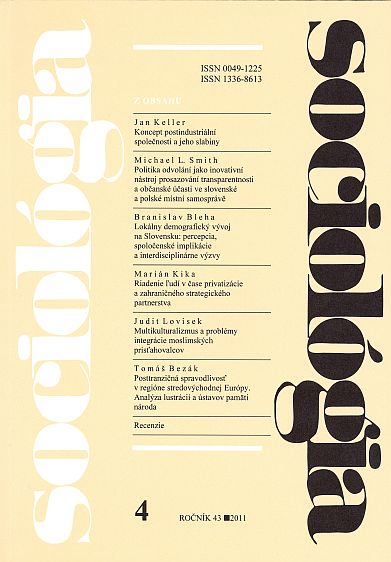Posttranzičná spravodlivosť v regióne stredovýchodnej Európy. Analýza lustrácií a ústavov pamäti národa
Posttransitional Justice in the Region of the Central-East Europe. An Analysis of the Lustrations and the Nation´s Memory Institutes
Author(s): Tomáš BezákSubject(s): Social Sciences
Published by: Sociologický ústav - Slovenská akadémia vied
Keywords: coming to terms with past; communism; lustrations; umbrella institutions aimed at the reflexion of undemocratic past
Summary/Abstract: Posttransitional Justice in the Region of the Central-East Europe. An Analysis of the Lustrations and the Nation´s Memory Institutes. The goal of this paper is to analyze the main processes of dealing with the communist past in selected countries in the region of Central-East Europe (CEE) – lustrations and the umbrella institutions aimed at the reflection of undemocratic past (the so-called institutes of national remembrance). The paper has two main hypotheses: I. Countries that democratized themselves through lengthy round table talks involving the representatives of regime and opposition had their coming to terms with undemocratic past delayed in comparison to the countries where transition was rather quick and controlled by opposition; II. Left-oriented political parties do support laws aimed at dealing with communist past (or do not object against it at least) only if there is a real threat that the next parliament will be more right-wing oriented and could possibly adopt a harsher law. In the first part the author argues that the transitional dynamics is of great importance for the policy of dealing with the oppressor regime. Where the process was quick and the opposition was in control, transitional justice will follow in early years after the system change and vice versa. But sooner or later the ideological alternation in government happened everywhere. Why had elites in those same countries later adopted lustration laws? A conclusive answer can be found by using the conceptual tools of game theory. The author analyses the preferences of relevant political actors and is therefore able to clarify the paradoxical situation when lustration laws were in various cases supported (or at least not objected) by left-oriented political parties. Sociológia 2011, Vol. 43 (No. 4: 420-446)
Journal: Sociológia - Slovak Sociological Review
- Issue Year: 43/2011
- Issue No: 4
- Page Range: 420-446
- Page Count: 27
- Language: Slovak

